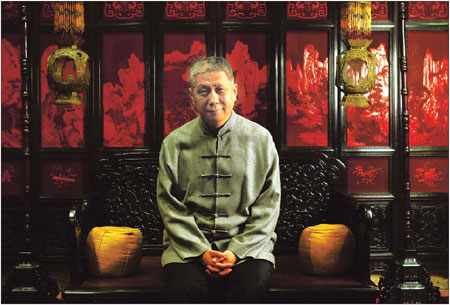Profiles
Ma Weidu and his timeless collection
By Qin Zhongwei (China Daily)
Updated: 2010-11-21 09:18
 |
Large Medium Small |
 |
|
Ma Weidu - self-taught scholar and antiquities expert. [Photo by Zou Hong / China Daily] |
One man holds fast to a fading code that values heritage and national pride above personal gain and fame. Qin Zhongwei seeks out the legend behind China's first private museum.
In an era when the rest of the country hoarded every spare penny towards a color television for the home, Ma Weidu was scrounging around flea markets and blowing his savings on scruffy doors and window-panels and worn-out chairs and tables. That was in the early 1980s, a misty period wedged between a life-changing revolution that had overturned traditions in life and art and an equally meteoric spurt of economic growth that would also redefine values and priorities in China.
It was his interest in literature that kept him locked to learning. In his early 20s, he sent a novel he had written to China Youth Daily, which not only published it but also appointed Ma as the youngest editor of Youth Literature, one of the most influential magazines of that time.
Ma's career was launched, and from those young days as an editor, he evolved and matured into a leading literary figure and scholar.
He also became one of the earliest playwrights to turn to the scripting of television serials, then gaining a grip on audiences in the late '80s and early '90s, thereby exerting his influence in yet another medium.
His lifelong habit of haunting flea markets for relics of the past also bore fruit, and his "useless collections" are now priceless. As the value of Chinese antiques rockets in international auctions, Ma probably has enough collected to make him one of China's new billionaires - if he decides to sell.
Instead, he has decided to donate all he owns to the nation, so these cultural treasures can be preserved for posterity in China's first private museum.
What motivates this man and his other-worldly code of values? To understand this enigmatic cultural knight in shining armor, you have to see him in the setting he has chosen.
In Beijing's northeastern suburb, far out on the Fifth Ring Road, Ma's Guanfu Museum sits in Jinzhan, an inconspicuous township within sprawling Chaoyang district. The journey is a tortuous route from town and locating Jinzhan demands a keen attention to road signs.
When the museum finally appears, it stands silhouetted like a desert island rising out of the demolished debris of its closest neighbors.
Despite its location, the determined and the faithful still find their way. Among them are illustrious names that sound like they belong to a fundraising socialite's party list - Leonardo DiCaprio, Jackie Chan, Chinese-American Nobel Laureate Samuel C. C. Ting and Wu Yi, the former vice-premier who was once one of the world's most powerful woman.
Guanfu Museum showcases some truly exquisite antiques and porcelain within its 5,000 square meters. Here again, Ma's unusual thought processes are clearly at work. Instead of the cold clinical displays that characterize most other museums, Guanfu's exhibits stay close to life.
Antique furniture is placed as they would have been in someone's home long ago along with displays of rare qinghua (blue-flowered) porcelain vases and jars.
But for Ma's staff members at the museum, the most precious exhibit is still the man himself.
It is a hero-worship that extends beyond the museum grounds. Often, Ma's many fans congregate outside the gates, waiting for a glimpse of the legend, often with a family treasure clutched in safe embrace as they wait for a chance to ask Ma's opinion and perhaps an expert evaluation.